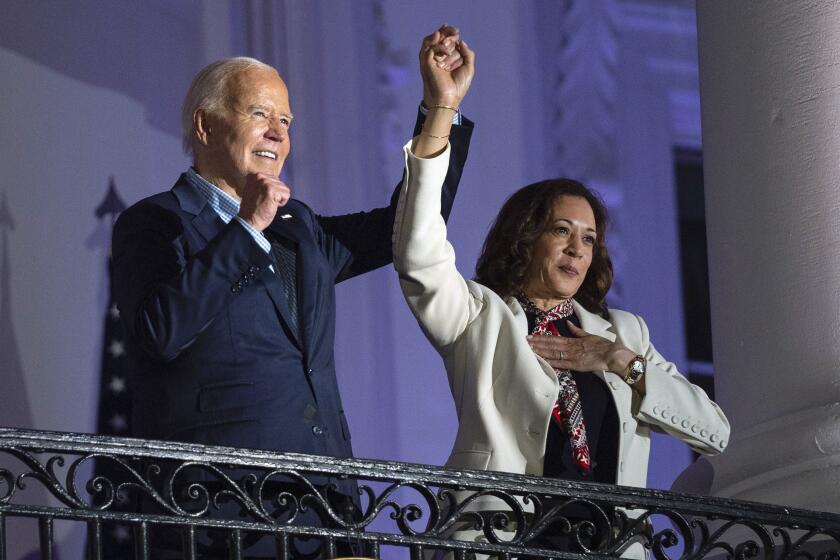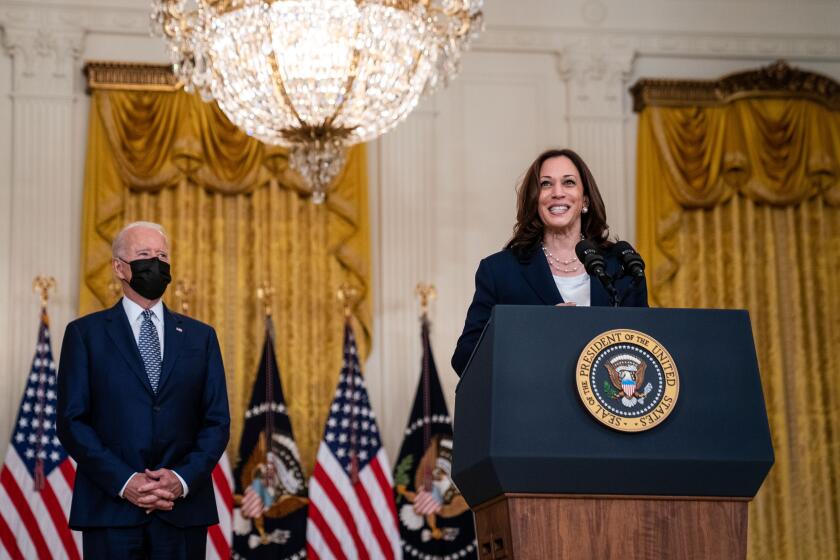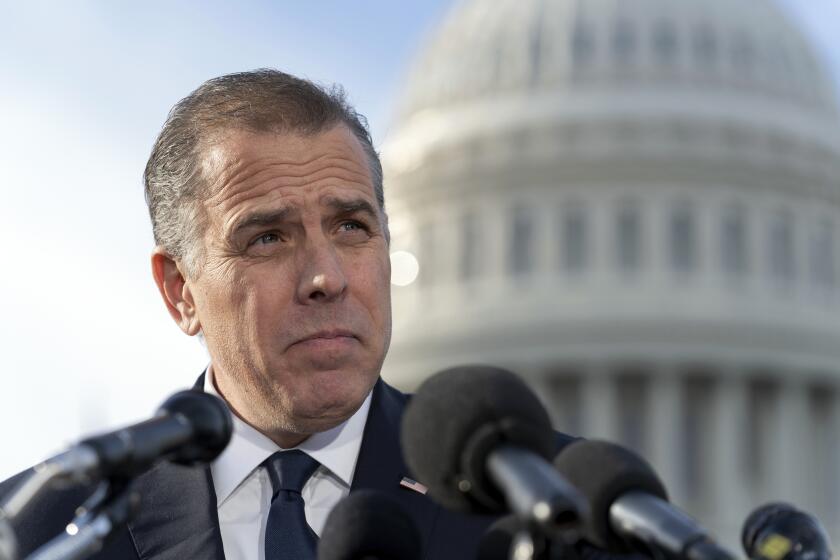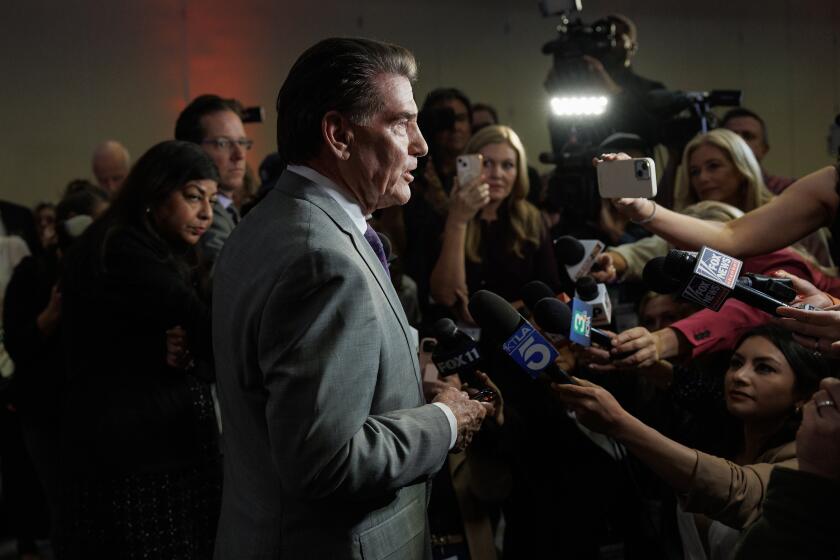He Urges National Sales Tax : Economists Like Babbitt Plan--but Few Others Do
If economists were the only people allowed to vote for President, Bruce Babbitt would be the favorite to move into the White House next Jan. 20.
Economists worry a lot about the deficit, and they believe the former Arizona governor’s proposed national sales tax--2.5% the first year and 5% after that--would raise big bucks toward closing the gaping deficit while leaving the economy relatively unscathed.
“It’s the least disruptive to economic growth,” said economist James Christian of the U.S. League of Savings Associations.
Babbitt’s determination to make budget reduction the centerpiece of his campaign has forced many of the other Democratic candidates to propose programs of their own, ranging from oil import fees to tougher Internal Revenue Service enforcement. None of their plans have gained the acclaim that economists have accorded to Babbitt’s--either they would not raise much money or they would jeopardize economic growth, according to the experts.
But for Babbitt, what is so attractive about him to economists is repellent to rank-and-file voters, who have rarely embraced higher taxes in any form.
More particularly, state and local officials, who depend heavily on sales taxes, do not want Washington dipping into this money pot. And Babbitt’s sales tax is open to the charge that it is regressive--that it hits harder at the poor, who spend most of their money, than the rich, who can afford to save.
“I think Babbitt’s sales tax is a Republican tax bill,” one of his rivals, Massachusetts Gov. Michael S. Dukakis, said to applause here last week at the Brown and Black Coalition’s presidential forum. “It’s regressive, and I think we ought to reject it out of hand. Bruce has a lousy tax plan.”
Babbitt fired back that his sales tax proposal “is better than your phantom tax bill.”
Responsibility for this contentious debate among Democratic presidential candidates belongs to President Reagan, whose economic policies have reshaped the political landscape. He will bequeath his successor, Democrat or Republican, a low unemployment rate and low inflation--and a massive national debt created by a string of huge budget deficits.
Traditional Smorgasbord
No longer can Democrats offer their traditional smorgasbord of ambitious new government spending programs. The money is not there. Instead, the would-be presidents have become enmeshed in arguing about whose formula is best for reducing the budget deficit.
Since last October’s stock market crash made millions of Americans edgy about the economic future, the deficit has become all the more important in the intraparty debate. The candidates generally agree on foreign policy, and they are unanimous on the need to protect social programs from further cutbacks.
To many economists, the deficit appears so big that only a hefty infusion of cash will provide a solution.
And this is where Babbitt has the advantage of specificity. His sales tax would generate big revenues, as much as $40 billion to $50 billion a year at a 5% rate. That would cut deep into the deficit, which was $148 billion in fiscal 1987 and expected to be at least that big in fiscal 1988, which began last Oct. 1.
Most other industrial nations depend heavily on sales taxes, as opposed to income taxes. “Eventually, the U.S. will move toward relatively greater reliance on consumption-based taxes,” predicted Jerry Jordan, senior vice president and chief economist at First Interstate Bancorp in Los Angeles.
Long-Shot Candidacy
Babbitt is basing his long-shot candidacy on the fact that he is the only Democrat willing to “stand up” (which he does, literally, at televised debates) for dramatically increased taxes.
Although his willingness to call for higher taxes--born out of a calculated decision to gamble on risky, highly visible policies last summer when his campaign was going nowhere--has won him excellent press reviews, it has not translated into significant gains in the polls, either in Iowa or nationally.
The two front-runners in Iowa, Rep. Richard A. Gephardt (D-Mo.) and Sen. Paul Simon (D-Ill.), are attacking each other over the budget gap. But they have put forth programs that, most economists believe, would have much less chance of achieving meaningful deficit reduction.
Gephardt wants to cut the deficit by freezing defense spending, curtailing grain production to reduce farm subsidies, eliminating special tax breaks and levying an oil import fee.
Simon promises to save money by cutting military spending and persuading the Federal Reserve to cut interest rates, thus trimming the cost of government interest payments on the debt. He would bring in more money by promoting U.S. exports, which would create jobs and generate new tax revenues. Only as a last resort, he says, should higher taxes be levied on high-income individuals.
Simon Scores Gephardt
Simon criticizes Gephardt for supporting the 1981 tax cuts, which he says contributed to today’s deficit, and the 1986 tax overhaul, which he asserts shifted the tax burden from the wealthy to the middle class. Gephardt says Simon’s budget program would merely add to the budget gap and denounces it as “Simonomics--Reaganomics with a bow tie.”
Bitter as the debate has become, many economists welcome it because they blame the deficit both for holding interest rates higher than they would otherwise be and for making the nation reliant on borrowing from abroad.
“Interest rates are much too high, and we have an enormous dependence on foreign capital,” said Lawrence Chimerine, chairman of WEFA Group, an economic forecasting firm in Bala-Cynwyd, Pa. “The question is how much revenue do you need, and very few people have faced up (to) the real issue.”
A sales tax such as Babbitt’s would “provide a lot of revenue, and that’s probably where we will end up someday,” said Kathleen Cooper, senior vice president and chief economist at Security Pacific National Bank in Los Angeles. “If we worry about the size of budget deficits, we need something along these lines.”
$20 Billion in First Year
Babbitt’s national sales tax would raise about $20 billion in the first year at a 2.5% rate, and $40 billion to $50 billion in the next year at 5%.
“Unlike an income tax, this would apply only to what we spend, not what we save,” Babbitt said. “That might encourage us all to save a little more, which would be good for our families and for the economy.”
Babbitt says he would reduce the tax’s burden on the poor by exempting food, medicine and other household necessities. He would also provide compensatory income tax relief for the working poor and sales tax rebates for the unemployed. He says he might add luxury excise taxes on goods purchased primarily by the wealthy, such as fur coats and jewelry.
Simon claims his plan promises a deficit reduction even deeper than Babbitt’s. But his big-ticket items rely on economic achievements that would be extremely difficult to attain: $45 billion a year in additional revenue by opening Japanese markets to U.S. goods and thus reducing U.S. unemployment by 1.5 percentage points; and $36 billion a year by persuading the Federal Reserve to let interest rates fall 2 percentage points lower than they are now.
More Direct Savings
Simon also proposes some more direct savings, including $20 billion over three years in defense spending cuts. As a last resort, he would impose a $5-per-barrel fee on oil imports to raise $9 billion a year. And if necessary, he would increase today’s 28% tax rate on incomes exceeding $192,000 a year ($100,000 for individuals).
Similarly, Gephardt claims deeper deficit reductions than Babbitt’s. He would pick up $46 billion a year: $12 billion by cutting farm subsidies, $10 billion by freezing defense spending, $12 billion by a $7-per-barrel oil import fee and $12 billion by eliminating special tax breaks.
The obstacles facing Gephardt would be largely political. For example, Rep. Robert T. Matsui (D-Sacramento), a member of the tax-writing Ways and Means Committee, said Congress would be unlikely to eliminate many special tax breaks close on the heels of the 1986 tax overhaul law.
Dukakis, in contrast to the other candidates, would rely heavily on increased tax collection and enforcement to reduce the deficit. By spending an additional $2.6 billion for enforcement, he says, the federal government could collect an additional $105 billion over five years, and he estimates another $10 billion by giving delinquent taxpayers a one-time tax amnesty for paying their back taxes.
Estimates Termed Inflated
Economists generally regard Dukakis’ revenue estimates as inflated.
“To hang your whole hat on getting a lot more revenue from enforcement and amnesty is naive,” Christian said. “If you get too far into enforcement, that can start being very intrusive. People generally pay their taxes voluntarily. You don’t want to get so intrusive you change their attitude.” Dukakis staunchly opposes any significant tax hike before tougher enforcement and tax amnesty are tried. “The governor would raise taxes as a last resort, but he doesn’t preclude it,” said Tom Herman of the Dukakis campaign. “No respectable candidate can rule them out.”
Dukakis does endorse trimming the defense budget. He would cut spending on the “Star Wars” missile defense program, cancel the anti-satellite system and stop additional spending on MX missile production. He would also cancel the proposed mobile Midgetman missile, which has the support of most of his Democratic opponents, including the three who are in Congress--Simon, Gephardt and Sen. Albert Gore Jr. (D-Tenn.).
Dukakis estimates his defense cuts would save $9 billion. That figure is widely regarded as realistic, although Dukakis might have trouble gaining congressional approval for all facets of his plan.
Gore is less specific than the other candidates about a solution to the budget dilemma.
‘We Must Reduce Deficit’
“I won’t mislead the American people,” he says. “I’m not going to put forth a detailed budget plan now. That will only add to the problem. We must reduce the deficit. But I won’t pretend we can do it in my first year or my third year. We don’t know what the economic conditions will be one year from now.”
Instead, he promises to convene a budget summit with Congress if he is elected President. He also opposes tax increases except as a “last resort.” If any new taxes are necessary, he says, he would consider an oil import fee.
The Rev. Jesse Jackson would rely heavily on higher taxes and lower defense spending to reduce the deficit. He wants to cut 12%--about $35 billion a year--from defense budgets and trim farm subsidies. He would also raise $20 billion a year by increasing taxes on corporations and another $20 billion by imposing a 38% income tax rate, compared to the present 28% rate, on people making more than $192,000 a year.
Defense Cuts Proposed
The $75 billion in defense cuts and revenue increases would be offset by about $20 billion in new outlays for housing, education, child care and health programs.
Former Colorado Sen. Gary Hart supports an oil import fee, a cutback in farm subsidies and higher taxes on corporations and affluent individuals. He also would raise revenues by converting import quotas into tariffs, and would boost taxes on cigarettes and alcohol. A new luxury tax would be levied on boats costing more than $15,000, cars priced in excess of $20,000 and on furs.
All the Democrats’ revenue-raising proposals would face political opposition. For years, proposed oil import fees have raised howls in New England, where they boost the cost of home heating oil, to California, where they would increase gasoline prices.
But these objections can be swept away in the enthusiasm that usually accompanies the honeymoon a new President enjoys with Congress and the nation.
“Who would have predicted in 1980 that Congress would pass a 25% tax cut?” said a senior congressional aide. “It seemed like an strange and irresponsible idea to a lot of people in this town before the election. But it became a reality when a popular new President named Reagan backed it.”
James Risen reported from Des Moines and Robert A. Rosenblatt from Washington.
HOW THE DEMOCRATS
WOULD TRIM THE
DEFICITBABBITT Impose national sales tax starting at 2.5% and rising to 5% after a year (food exempted). Tax all Social Security benefits for individuals with incomes over $25,000. Cut $10 billion a year each from military and domestic spending. Cancel anti-satellite program and MX missile purchases.
DUKAKIS Improve IRS enforcement powers. Offer one-time tax amnesty. Cut defense spending. Cancel MX and Midgetman missile programs. Restructure welfare programs to save money.
GEPHARDT Impose oil import fee. Close tax loopholes for corporations. Broaden the tax base. Freeze defense spending, allowing only inflation adjustments. Reduce farm subsidies.
GORE Hold a budget summit with Congress after being elected. Impose oil import fee only as a last resort.
HART Impose oil import fee. Raise taxes on corporations and the wealthy. Convert import quotas into revenue-generating tariffs. Tax capital gains at death. Raise taxes on alcohol and cigarettes; add new luxury taxes. Cut spending through military efficiencies.
JACKSON Cut defense spending by 12%. Reduce farm subsidies through production limits. Raise top tax rate on incomes above $192,000. Raise taxes on corporations through strengthening minimum tax and possibly eliminating accelerated depreciation. Reduce tax deduction for business meals.
SIMON Cut Pentagon spending by 7%. Eliminate two nuclear carrier groups and MX missile. Negotiate reductions in trade barriers, thus helping U.S. exports, creating jobs and generating tax revenues. Encourage Federal Reserve to lower interest rates. Raise taxes on incomes over $100,000 a year. Impose oil import fee. Raise cigarette taxes.
More to Read
Get the L.A. Times Politics newsletter
Deeply reported insights into legislation, politics and policy from Sacramento, Washington and beyond. In your inbox three times per week.
You may occasionally receive promotional content from the Los Angeles Times.






